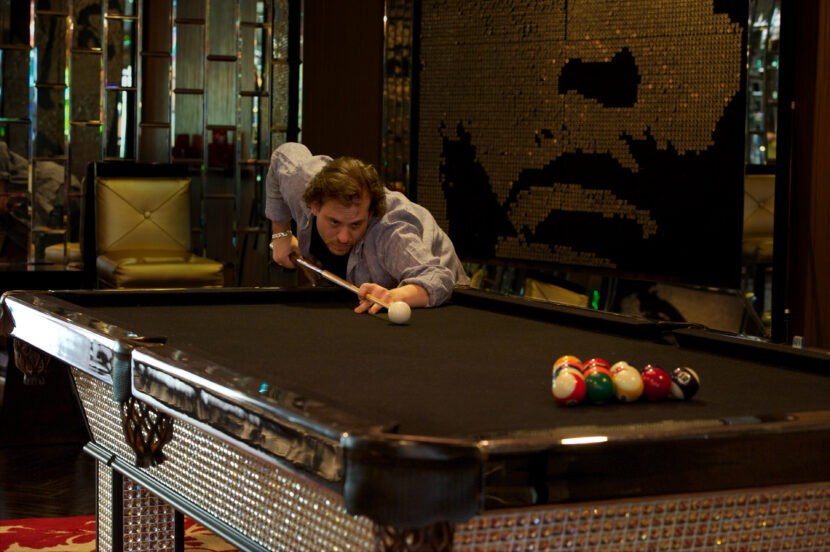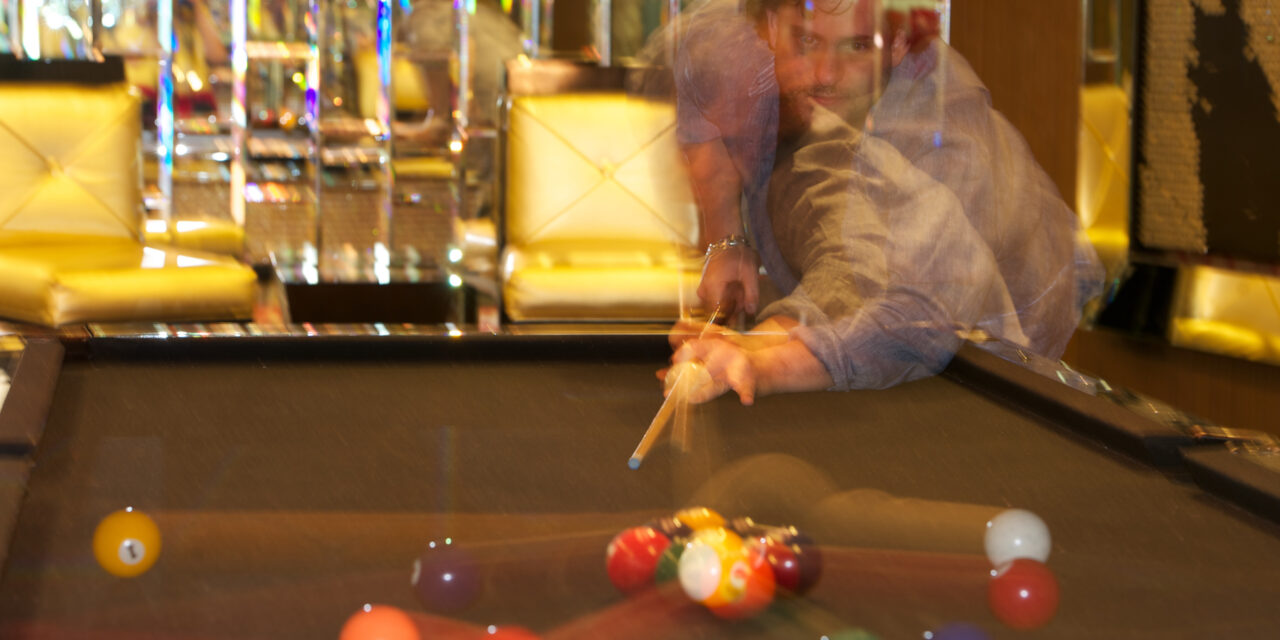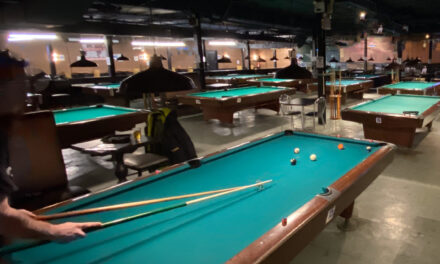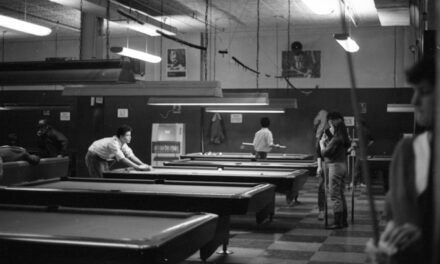The year is 1988. At my local pool hall, for months I had been hearing about a legendary player called “The Gypsy”. One day I was practicing. The room was mostly empty. There were a few regulars, but we all knew each others’ ability so I couldn’t play any of them.
They wanted to play for money, and I was willing to gamble. But they all wanted an “even-up” game, meaning “no handicap in either direction”. Every one of them was better than me, so I knew I wouldn’t have a chance of winning. So no game. We’re all just standing around aimlessly, or practicing solo.
I heard murmurs, and “The Gypsy” came in. I had never seen him, and didn’t know what to expect. He was surprisingly ordinary in appearance, maybe college age, a light-skinned Eastern European with black hair. Blue jeans in a tacky style more suited to suburban malls than the urban center of Manhattan.
As he twisted his way through the maze of pool tables, he made eye contact with the familiar denizens. A few glances in my direction sent him wandering closer. Big smile from The Gypsy, as he asked, “Hey, uh, you looking for a game?” I just laughed.
“Sure, I’d like to play, but I know you’re way better than me,” I offered.
He was eager, “C’mon, $100 a game, I’ll spot you the 8-ball.” The game we were playing was 9-ball. You win 9-ball by playing the balls in order, from one through nine, and whoever sinks the nine wins. His offer is that I can win if I sink the 8 or the 9. It makes the game quite a bit easier for me.
At that time in my life, I would normally play for $5 a game, or maybe a set of games for a total of $20. So he was asking me to wager 20x my comfort level. At that time I believe my job paid $8 an hour.
I pushed harder and he offered to spot me the “6-up”. That means I win if I sink the 6, 7, 8, or 9 ball. There are four balls on the table that can let me win instantly. This handicap was enormous. That’s the level of handicap I might offer a friend who had never played before. It’s astounding that he didn’t try to negotiate the 7, 8, 9 first, but went directly to offering me 6, 7, 8, 9.
I laughed, and said “there’s no possible way that’s enough”. I didn’t even have to think about it. You never take the first offer. He’s smiling. We’re playing the game. As I said before, there are two games of pool — the obvious one is about sinking balls on the billiard table, but really the money is won or lost during the invisible game: the negotiation.
Until this point, he was willing to make these handicap offers without ever having seen me play. It’s common to watch another player for a while before offering handicap, but he and I had never met. I wasn’t practicing when he walked in, I was just standing around. He scoffed, looked at me, and said, “Are you any good?”
Before I could answer, he asked a wiry, middle-aged regular who was watching and smirking. “Is this kid any good?”, he asked, openly and within my earshot. Pool halls back then didn’t have music. The giant room had 52 tables, but only maybe 10 were being used. So everyone standing nearby could hear the question clearly in the air, over the murmur of balls quietly clicking in the distance.
“He’s okay,” the regular said, looking at me with a smile. “Plays about as well as Bobby.” I didn’t know Bobby, but The Gypsy nodded knowingly. The regular then volunteered, “the kid beat Rebel last week.” I was very proud of winning a little money against Rebel, one of the regulars who I considered to be above my level. Not thrilled that this information was now going to raise the bar for my negotiation.
The Gypsy looks me up-and-down one last time. He says, “Listen, kid, here’s what I’m going to offer you. We’re going to play a race to win 10 games. You win on the 6, 7, 8, 9. And I have to win 10 games but you only have to win 5. But we’re playing $100 a game, so if I win that’s $1000. Do you have $1000 on you?”
I absolutely did not have that much money. I had $106, and I had a pretty strict rule that I would not play a set of games for more than $20. Playing single games for $5 was a lot to me. Also, the pool room charged money for the time to rent the table, maybe $10 an hour back then. And it’s customary for the loser to pay the table time. The Gypsy was asking for a game that was far out of my range. But it was finally time for a counter-offer.
“Gypsy,” I said, nervously laughing, “As much as I’d like to play these games, I seriously don’t think I could beat you even once. Not even with the 6, 7, 8 handicap you’re offering. I don’t know how a player could possibly be that good, but I bet you are. You wouldn’t be making this offer if you weren’t sure you could win. Also, I don’t have anywhere near that much money.”
“How much do you have?”, he asked, his enthusiasm waning.
Continuing, I offered, “How about this? Race to 10, but I only have to win one single game. And I have the 6/7/8. Also, I’m just telling you now, I only have $106, so if the match takes longer than a half an hour, I won’t be able to pay more than $6 toward the table.”
He perked up a bit, now that an actual offer was on the table.
“I don’t play less than $100 a game,” he said, “and you’re asking me to waste the time of playing 10 games for that? And you only have to win one game? Ridiculous.”
I was proud of myself. Being called “ridiculous” meant that I had finally moved the discussion outside of his comfort zone. He countered quickly.
“Ok, fine, you got a game,” he came back, “But I can’t play that you only have to win one. With the 6/7/8, it’s insane, even for me. You have to win two games before I win 10. Deal?” By now, a small crowd had gathered around our table. I could hear an occasional whisper, “the Gypsy’s going to play this kid…”
“Deal,” I said with a smile and false confidence, as I started setting up the balls for the first game. And then my reminder, “Remember, if I lose and it takes more than a half an hour, you’ll need to use some of your winnings to pay the rest of the table time.” He won the competition to see who takes the first shot. Of course.
“Kid, it won’t take that long,” he smirked before letting loose a thunderous break to begin the match.
“You know,” I smiled back, “I pretty much expect you’re going to win this, even with the ridiculous handicap. But it’s worth $100 to me, to see it happen.”
The rules of 9-ball allow the winner of one game to take the first shot of the next. At that time, my skill level was high enough that I could often win two or three games in a row, during a 10-game match. So I figured if he ever gave me a clear shot, maybe I could seize that single opportunity and win the match. I only needed two wins.
The Gypsy won the first four or five games consecutively, without giving me a single chance to shoot. By the time I finally got a turn, he had deliberately left the cue ball stuck in such a terrible position that I had no chance of even attempting anything. It took until maybe game 7 before I got a clear shot. I did manage to win one, but not the two games that I needed. And then it was all over.
The match went exactly as I expected: I got an astounding lesson by watching this artist at work. “Good job,” he said, “you made me work for that.” And then I walked home, with $2 in my pocket.






